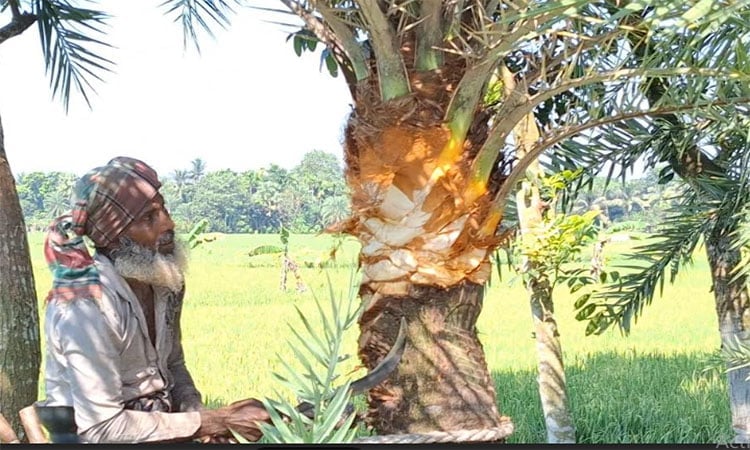News Flash
News Flash

JHENAIDAH, Oct 26, 2025 (BSS) - Jhenaidah, a region long famous for its date juice and molasses, is now buzzing with preparations as winter approaches.
Across the villages of the district, gachhis- refers to the person who climbs date palm trees to extract their juice – are getting ready for the juice collection season.
Although the number of date palms has decreased over time, efforts to extract the sweet sap continue.
However, the number of gachhis is also shrinking each year. Meanwhile, preparations for boiling sap, making molasses, and marketing the products are in full swing.
An on-site visit found gachhis in villages such as Chorhkol, Ganna, and Laxmipur of Sadar upazila busy preparing the trees. Early each morning, they rush to the fields carrying tools like thungi (containers), boildhara (sap funnels), ropes, and knives. With skilled hands, they clean the tops of the trees using sharp machetes. After cleaning, each tree is left to rest for about two weeks. As winter nears, the eyes of farmers gleam with dreams surrounding the grand event of sap collection and molasses making.
Abdur Razzak, a gachhi from Defolbari village under Sadar upazila, told BSS, “In other years, we start preparing the trees about ten days before the month of Kartik begins. But this year, due to frequent rains, tapping has been delayed by about a week. Sap collection will begin in the second half of Kartik. The first batch of sap will be used to make nolen gur (fresh molasses).”
Jhenaidah is widely known for its date juice and molasses. Once part of the greater Jashore district, Jhenaidah shares in that legacy. Every year, the six upazilas of the district produce about 800 to 850 tons of date molasses. The gachhis in the villages make these products naturally and safely. Raw date sap is also extremely popular. There is high demand for date molasses, sap, and patali gur (solid molasses) across Bangladesh, and Jhenaidah supplies these products nationwide.
According to updated data from the Department of Agricultural Extension, there are currently about 142,235 date palm trees in the district. Of these, around 112,760 are suitable for sap extraction. The rest are young saplings or trees that are not tapped. Each winter, Jhenaidah produces approximately 48.14 lakh litters of date sap and around 872 metric tons of molasses—enough to meet local demand and supply other districts.
Samir Mondal, a gachhi from Panchlia village in Kotchandpur union, said; “Now the number of trees is going down. People don’t want to tap the few trees left. I’m over 60, but I still tap trees and make sap. Date juice and molasses are part of our heritage. If they disappear, the charm of our villages will too. That’s why I still work during winter. To preserve Jhenaidah’s tradition, new date palms must be planted.”
Nobiran Nesa, a housewife from Kumrabaria village in Sadar upazila, said, “In about ten days, sap will start coming to our house. We’ve already built the bain (large clay stove) for boiling and stored wood and kindling. The men bring sap from the field, and we women boil it to make molasses. Everyone—men and women—help make gur and patali. It earns us some extra income each year. In winter, you need gur for pitha and payesh (traditional sweets). We make pitha-puli, payesh, kheer, and sweets with our own molasses. People from towns come and buy it too.”
Talking to BSS, Md. Kamruzzaman, Deputy Director of the Department of Agricultural Extension in Jhenaidah, said, “We’ve taken initiatives to prepare a list of gachhis. There are plans to train them on safe sap collection, molasses production, and marketing. Jhenaidah is a historically famous region for date molasses. This year, our target production is about 900 metric tons. Farmers across the district have already prepared their trees, and sap collection may begin next week. We’re keeping close contact with the gachhis and farmers.”